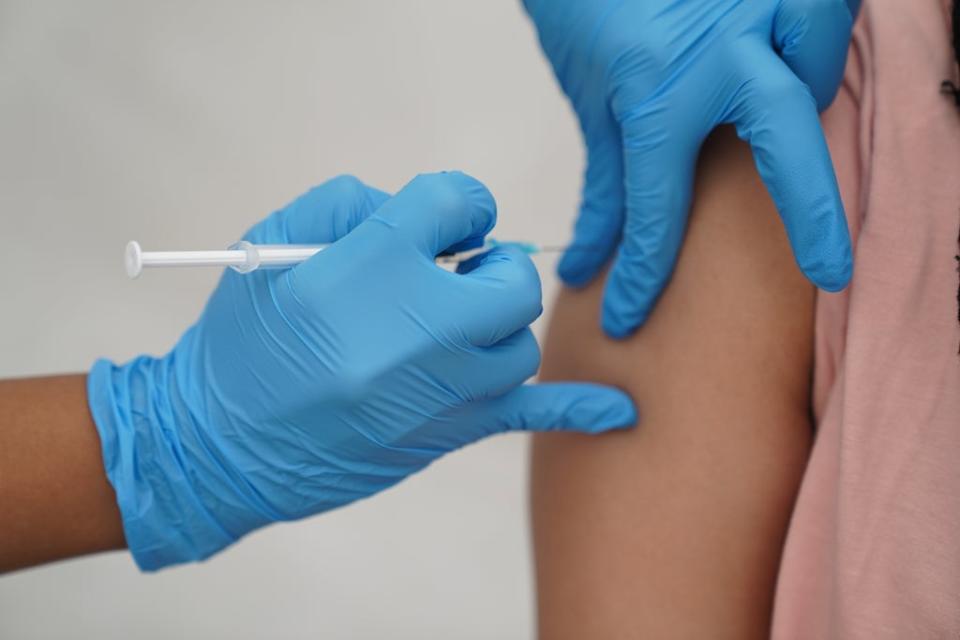All you need to know about the UK’s coronavirus booster jabs programme

The coronavirus booster programme has been extended to the over-40s.
Here, the PA news agency takes a look at all you need to know about further jabs.
– What is a booster jab?
Booster jabs are top-up doses of vaccine which health experts in the UK are advising should be given at least six months after a person has had a second jab.
We are expanding the COVID-19 booster programme to people aged 40 and over.
This follows the advice of independent experts at the Joint Committee on Vaccination and Immunisation (JCVI).
➡️https://t.co/3cbHIZQXml pic.twitter.com/ztCdPhd2ag— UK Prime Minister (@10DowningStreet) November 15, 2021
– But I thought I was fully vaccinated after my two injections – why would I need another one?
Recent data from the UK and also internationally has given early signs of a slight fall in the levels of protection against severe disease in people who had their initial vaccines a long time ago, the Joint Committee on Vaccination and Immunisation (JCVI) said.
The committee said boosters are being offered to eligible groups to help them “maintain high levels of protection against hospitalisation, severe illness or dying over the winter”.
England’s deputy chief medical officer Professor Jonathan Van-Tam said while vaccines have saved “countless lives and helped restore our freedoms in an unprecedented way”, it is clear “protection will wane over time after the first two doses of a primary course – that is especially so in older adults and those with risk conditions”.
He said the waning is also beginning to show in the 40-49 age group, something he would expect to increase in the absence of boosters.
Excellent data from @UKHSA today shows that getting your booster increases protection against symptomatic infection to more than 90%.#GetBoosted https://t.co/EmonINvvCQ
— Sajid Javid (@sajidjavid) November 15, 2021
– How much does immunity wane by?
In August, a study concluded that the protection provided by two doses of the Pfizer BioNTech and the Oxford/AstraZeneca coronavirus vaccines starts to wane within six months.
Scientists behind the Zoe Covid Study app said that the Pfizer jab was 88% effective at preventing Covid-19 infection a month after the second dose, but after five to six months the protection decreased to 74%.
With the AstraZeneca vaccine, there was a protection against infection of 77% one month after the second dose but after four to five months, protection decreased to 67%.

– How much difference might a booster jab make in terms of protection then?
A study by the UK Health Security Agency (UKSHA) suggested that two weeks after getting their booster, adults over 50 had at least 93% reduced risk of getting a symptomatic case of Covid-19.
Protection against more severe disease and death is expected to be even higher, and Professor Wei Shen Lim, chair of Covid-19 immunisation for the JCVI, said a booster dose “markedly strengthens existing protection and will extend the duration of that protection against serious disease”.
– Which vaccines are being given as boosters?
The JCVI has recommended either the Pfizer-BioNTech vaccine, or the Moderna vaccine – the latter given as a half-dose booster shot after studies showed it was effective at this dose, with few side-effects.
Both vaccines are expected to give “a good level of extra protection”.
– So who is eligible for a booster?

People aged 40 and above, and anyone in a Covid-19 at-risk group.
These include: people who live and work in care homes, frontline health and social care workers, people aged 16 and over with a health condition that puts them at high risk of getting seriously ill from the virus, anyone aged 16 and over who is a main carer for someone at high risk from the virus, those aged 16 and above who live with someone who is more likely to get infections, for example someone with HIV, or who has had a transplant or is having certain cancer treatments, and anyone who is pregnant and in one of the eligible groups.
– When can I book?
Those eligible can have a booster dose at least six months after their second jab, but can book their appointment after five months.
Prime Minister Boris Johnson said: “The message is: anybody over 70, come forward, get your booster; anybody over 50, come forward and get your booster now; in the next week or so, anybody over 40 as well, come forward and get your booster.”
Health Secretary Sajid Javid said he had asked the NHS “to prepare to offer those eligible a vaccine as soon as possible”.
– Is the advice the same across the UK?
Mr Javid said all four nations intend to follow the JCVI’s advice.
It may well be that adults who are under 40 years might require a booster dose or a third dose at some point
JCVI chair Professor Wei Shen Lim
– Could the advice be extended to include under-40s?
Possibly. Mr Javid said the JCVI “will keep under review whether the booster programme should be extended to all people under the age of 40″.
Prof Lim said: “It may well be that adults who are under 40 years might require a booster dose or a third dose at some point, we don’t know whether that is definitely the case yet.”
Read More
PM’s attempt to draw line on Paterson row thrown into chaos by Tory MP
Young women ‘must save an extra £185,000 to reach same retirement income as men’

 Yahoo News
Yahoo News 